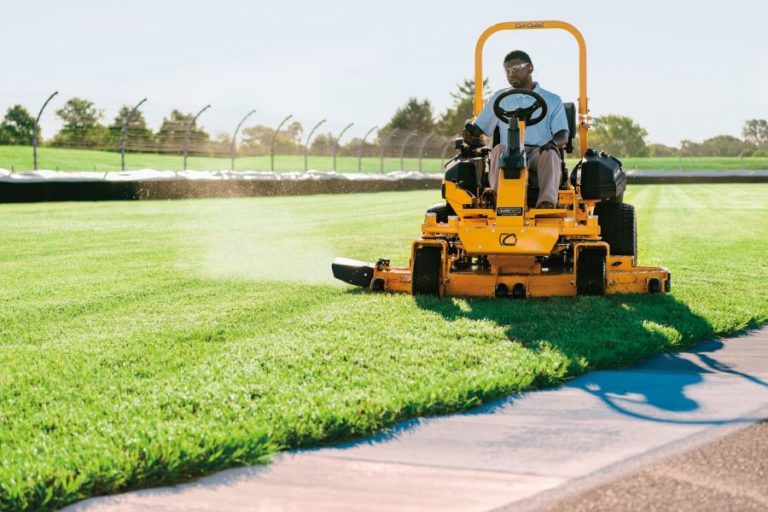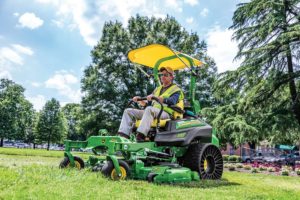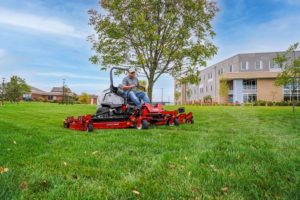By John Kmitta
Industry experts from major commercial mower manufacturers agree that the biggest challenges this year for mowing professionals in the green industry will be supply chain issues, rising fuel costs, higher prices across the board, and, of course, the continued shortage of labor.
“The industry was facing a worker shortage prior to the pandemic,” said David Dwight, director, Briggs & Stratton – Turf and Consumer Products Group (Ferris Mowers). “The pandemic further limited the overall available labor.”
“Finding reliable employees continues to be tough,” said Brad Unruh, director of new product development, Stanley Black & Decker Outdoor (Hustler Turf).
Steven Benedict, turf care product line manager, Kioti Tractor, added that labor challenges make it even more critical to have reliable and efficient equipment.
According to Josh Sooy, director of the professional business segment for Cub Cadet, those impacted by labor shortages are looking for solutions and equipment that can help increase the efficiency and productivity of their operations. This includes exploring viable autonomous technologies and continuing to invest in stand-on mowers.
Ron Scheffler, senior product manager, Doosan Bobcat North America (Bobcat, Ryan and Steiner), added that mowing professionals should identify products that will best help their needs. “For example, which commercial mower will allow me to clean my equipment quickly, make standard maintenance updates as fast as I can, and overall, be the most efficient product,” he said.
“One of the best ways operators can combat labor challenges is to have a partner in their dealership,” said Chad Carney, go to market manager, B2B PLC segment, John Deere.
Carney added that dealers who take the time to truly get to know their customers and understand their needs become a go-to resource for their customers, ensuring that the customer will be loyal to that dealer for years to come.
According to Grant Wilson, product director, Gravely, and Angie Ansorge, product manager, Gravely, commercial users are having a hard time finding the right machines or parts for their equipment. As a result, Wilson and Ansorge recommend keeping extra parts on hand.
“The biggest challenges that commercial mowing professionals are facing, and will continue to face, this year are the supply chain issues that began in 2021,” said Unruh. “We recommend ordering early and often and staying in regular communication with their dealers to help estimate shipping times.”
“We anticipate the constrained supply environment will resolve over time and are working hard to mitigate any impact on our professional customers,” said Jared Nuessen, marketing manager at Toro. “In the meantime, be proactive when it comes to maintaining parts inventory to ensure you always have what you need on hand. While there may not be an issue sourcing a particular product or part currently, keeping a well-stocked inventory will help you avoid issues down the road.”
Exmark Director of Marketing, Jamie Briggs, added that professionals might not be able to find the exact model of equipment they have purchased in the past, and may have to purchase an alternative model with different features or specifications.
Said Mark Krakowiak, product marketing manager, professional products, Stanley Black & Decker (DeWalt), “Plan to purchase your new products early in the season, along with service and wear parts well before you will need them. Given current supply chain challenges, if you are considering any new purchases, it is best to buy as soon as possible.”
Wilson and Ansorge echoed those thoughts, stating that prices of the machines will continue to rise, so purchasing new mowers sooner rather than later will provide significant savings.
According to Dwight, when it’s time to think about replacing a piece of equipment or adding equipment to meet growing demand, start that conversation with your dealer sooner than you have in the past to ensure that the unit you want is available when you need it.
Tony Buxton, senior product manager for Milwaukee Tool, added that walk-behind mowers are a great supplement to ride-on mowers for accessing tight areas, and investing in battery-powered solutions will allow users to stay head of emerging requirements. “Through utilizing a combination of gas and battery-powered equipment, the professional market is gaining an understanding of how battery technology can benefit them now and in the future,” Buxton added.
According to David Bush, senior marketing strategist, general purpose engines and industrial products, Honda Powersports & Products Group, despite the challenges industry professionals face, it’s important to expect the unexpected and look for equipment that is efficient, reliable and quiet that can maximize productivity and return on investment. He added that fuel-efficient and lower-emissions products, along with battery-powered products, are proving to be attractive.
Professionals should look for mowers that allow them to be efficient and effective on the jobsite, and should consider a variety of factors in their mowers, including user comfort, ease of use and high machine uptime, said Benedict.
According to Briggs, users should make the most of their existing equipment, which means staying on top of scheduled maintenance and replacing worn parts.
Unruh recommends looking for mowers that are affordable, durable, and ergonomically designed to ensure comfort, and come standard with a manufacturer warranty. “The convenience factor also applies to mower/equipment maintenance; keeping all business at one trusted dealer will save time and resources,” he said.
Carney agreed, adding that the deciding factor when purchasing a mower can often be the relationship you form, the support you receive, and the dealership service you obtain that makes the difference in the brand you choose.
Said Scheffler, “With labor shortages affecting business, saved minutes really add up to dollars in the pocket, and a mower that is quick to clean and maintain, as well as to be ready for the next working day is important.”
According to Dwight, it is important to understand that everything from maintenance to downtime to operator comfort will impact productivity.
“You need machines that are built around your needs, so always be willing to try something different,” said Sooy. “Whether it’s new mower products or technologies, demo different machines and get a feel for how they operate to ensure you’re investing in those that work for your business.”
Added Briggs, “We expect 2022 to be a good year, but it won’t be without its challenges.”
John Kmitta is associate publisher and editorial brand director of SportsField Management magazine.




